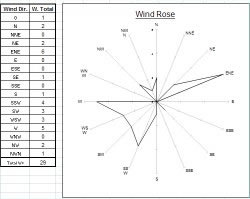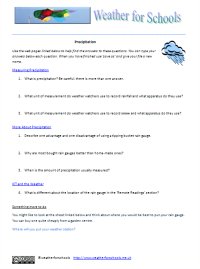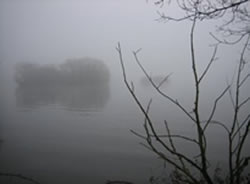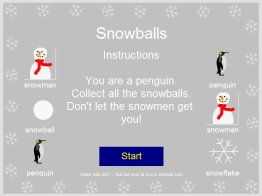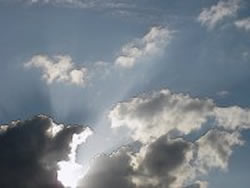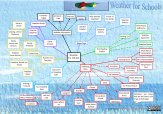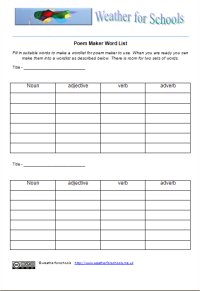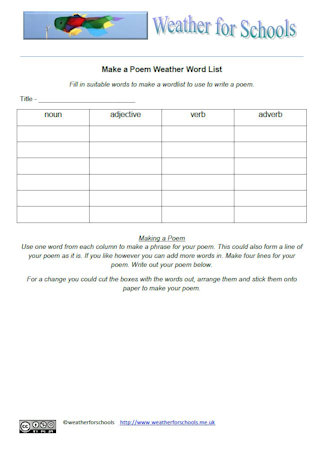Teachers and Parents
This website is generally aimed at 7-11 year olds, but it may have relevance to any age above that, including adult weather enthusiasts. There are several pages of activities for younger weather enthusiasts. These are called The Under Fives.
Running a weather station and keeping a record of the weather is both educational and interesting. This website will be useful to see what Basic Apparatus you will need, learn how to make a Weather Box and to learn more about Setting Up. The Quizzes provide a few interactive activities to test the ability to read scientific equipment. See a list on the right. If teaching about the use of ICT in the real world there are two pages on this; ICT and the Weather and More About ICT and the Weather.
Some more ideas on cross-curricular weather ideas are included below
Weather PoetryThe weather is a wonderful source of inspiration for poetry. Taking a picture of a weather scene and gathering other vocabulary around it can be a super stimulus. Be a Poem Maker. Choose a weather theme. You could chose 'wind', 'rain',' sunshine' or any other type of weather. Use the wordlist grid listed on the right. Fill in the title and a choice of weather words .Randomly select one word from each column and write them down. Repeat this process four times to make four lines of a poem. Read what you have written. Make any swaps that you like to improve the effectiveness of the poem. The illustration on the right was made using this technique. |
 |
Using ICTThere are two pages on using ICT with the weather, but there are also lots of other references. The two ICT pages are linked in the section on the right. Another main area relating to ICT is the weather data included as spreadsheet files. These are on the Weather Data Page. Some of these files contain data, others are blank ready to have data entered. They contain formulae, graphs and useful headings. The graphs have been designed to aid error checking, and to enable useful comparisons. Gradually data for the year is being added. The first data on this site is for January 2009 and is provided as a basic example and a standard example. |
|
VideosTo make the site more informative videos have been included where they would help the understanding of the text or where they give an example of what can be observed when weather watching. This may also inspire others to make more use of the video aspect of their digital photography. It can show so much when the moving image is used. An out-take is shown on the right. These videos can take quite a while to do, and don't always go as expected. |
|
WebquestsUsing the website alone is helpful in developing web navigation skills. There are pages to navigate, links to follow, videos to watch, internet safety rules to obey and files to open. On various pages there are webquests, which are sheets with questions and links to the pages where the answers can be found. These have been left in MS Word format so that the hyperlinks can be used and the answers amy be typed in if desired. They can then also use 'save as' to save their work. A full list of the webquests can be found in the files section of the Contents Page. One example is shown on the right. |
|
Have a Weather Day at schoolIf you would like
to celebrate your interest in the weather with your whole school
you might like to look at the Whole School Weather Day. It has ideas and supporting materials for every year group in the school. |
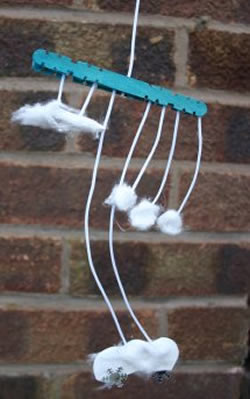 |
Weather musicThink about the weather in music. There are links to some windy songs on the Windy Words and Actions page. Search for relevant songs on Amazon, listen to previews, or buy the MP3 files often for less than a pound. Sections in classical music can often me inspiring. Try the Winter section of Vivaldi's Four Seasons or the 4th movement of Beethoven's 6th Symphony (a storm). As well as considering storms, think about the quiet hushed sounds you might hear in fog. This will need a very different type of instrument. Rainbow music could incorporate both sunny and rainy weather! |
Try out a variety of percussion instruments. Discuss what sort of weather they could be used to represent. Work in groups to compose a short piece. Use pictorial representations to record a score. You could record the finished compositions and share them with the rest of the schools as a podcast. |
Design a Weather StampLook on the General Interest page to see a link to website with lots of weather stamps from all over the world. The 'Things to do' section gives you an idea of something creative and arty for you to do. |
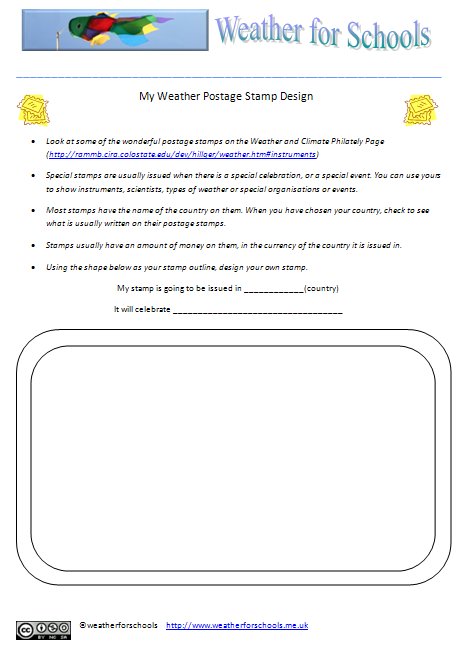 |
Making GamesComputer games can be developed using weather as the theme. These games can either be constructed by the children, or made by an adult for the children to play. This can be a good introduction to the skills needed for computer programming. |
Click on the picture above to try out the game. |
Making paper snowflakesIf you would like to make paper snowflakes that have six points just like the real ones go to the Below Freezing page. You will find all you need to start making super snowflakes like the one on the right. After a while you may even be able to make more complicated ones. |
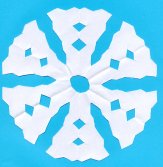 |
Ancient Greece and the WeatherThe Tower of the Winds in Athens is a building which reminds us that the Ancient Greeks were interested in the weather just like us. They built a tower that had an octagonal floor so that there was one wall to illustrate each of the eight winds. It also had a water clock inside it, and a sundial on the walls. |
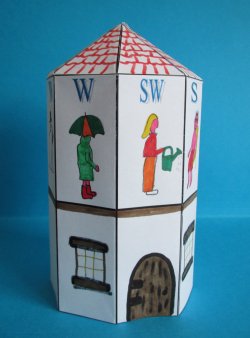 |
Art ImagesTaking artistic weather images is great fun. Some ideas for using them in a creative way can be found on the General Interest Page. The example on the right shows a cloud image with a 'hot wax' effect. |
